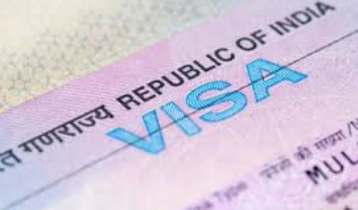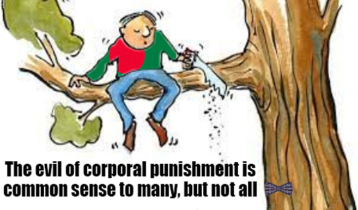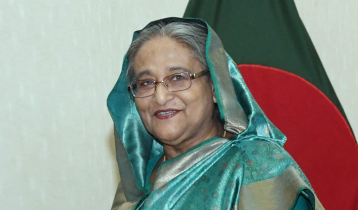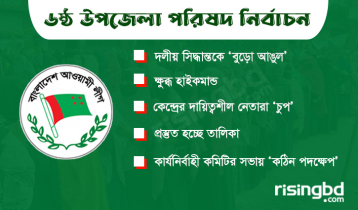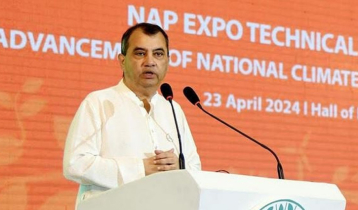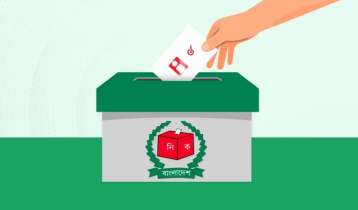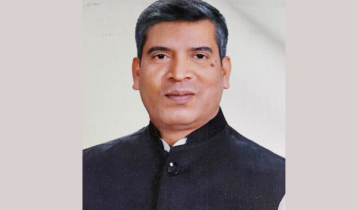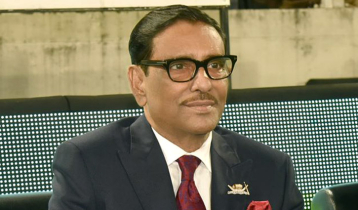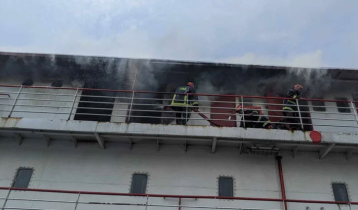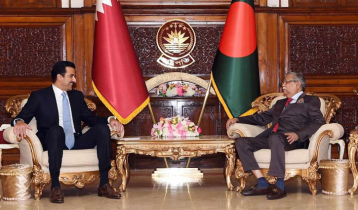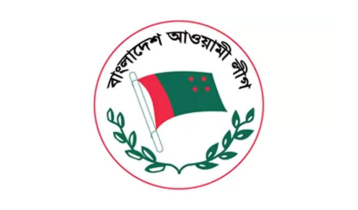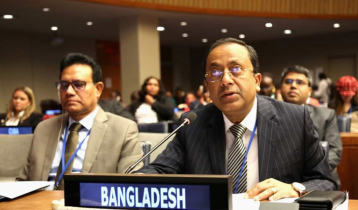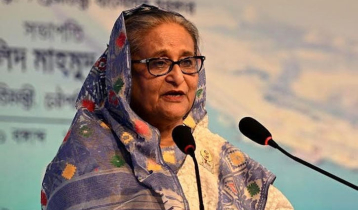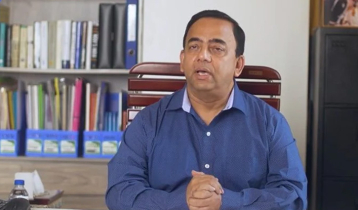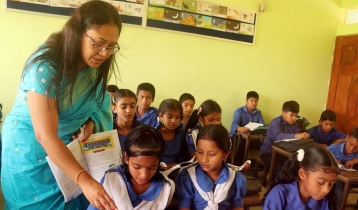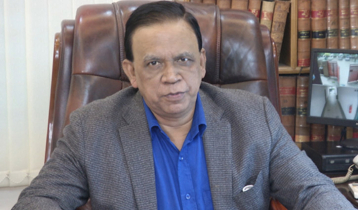We need to stop tobacco expansion
|| risingbd.com
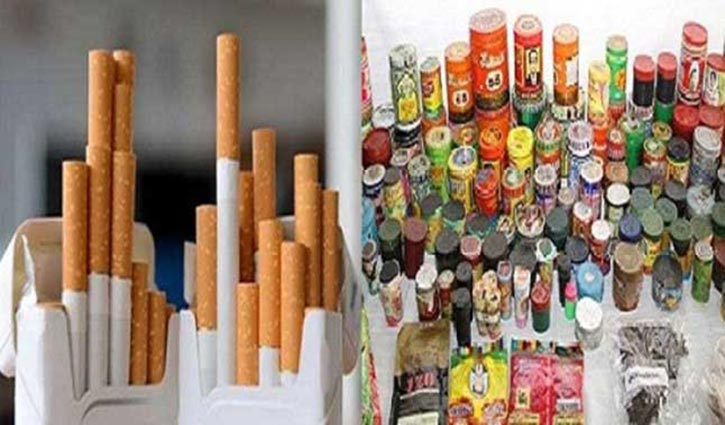
By Md. Alim Al Razi: Introduction: Bangladesh is going to be the third fastest growing economy in the world in terms of achieving high Gross Domestic Product (GDP) in 2019, according to a report of United Nations.
The report indicated Bangladesh economy is also expanding at a fast pace in the coming year, above 7% per year, amid strong fixed investment, vigorous private consumption and accommodative monetary policy.
The report also indicated that Bangladesh economy will grow at 7.2% in 2020, while Indian at 7.4%. Focusing on global economy, the report emphasized undertaking urgent and concrete policy action to reduce risks to the global economy and secure the foundations for stable and sustainable economic growth. Policymakers must work to contain short-term risks from financial vulnerabilities and escalating trade disputes, while advancing a longer-term development strategy towards economic, social and environmental goals. Bangladesh is a developing country with promising economic power in the world and rapidly expanding the areas of manufacturing and industrial sector.
In respect of the report, it is a matter of despair that tobacco industry with full of modern manufacturing equipment and marketing strategies are growing like a monster and simultaneously reproducing large level of profits year after year. Though they pay a large number of taxes and create opportunities to develop a prestigious career for highly professionals, it is merely like a parasite in comparison to the other side of the sector.
On the other hand, according to the recent statistics of the Tobacco Atlas Bangladesh, it is stated that tobacco harms the health, the treasury, and the spirit of Bangladesh. Every year, more than 161200 of its people are killed by tobacco-caused disease. Still, more than 172000 children (10-14 years old) and 24880000 adults (15+ years old) continue to use tobacco each day. Complacency in the face of the tobacco epidemic insulates the tobacco industry in Bangladesh and ensures that tobacco's death toll will grow every year. For male, 39.8% adult 15+ and 1.86% children using tobacco daily (2015) and more men smoke in Bangladesh than on average in medium-HDI countries. For female, 0.7% adult 15+ and 0.2% children using tobacco daily (2015) and still more than 979500 women and 15900 girls who smoke cigarettes each day and obviously making it sign of an ongoing and dire public health threat. And 25.54% male deaths caused by tobacco (2016) and 9.68% female deaths caused by tobacco and more male and female die in Bangladesh than on average in medium-HDI countries.
Tobacco Atlas Bangladesh also brought intentional estimation of harms caused by smoking in their Sixth Edition of Tobacco Atlas Sixth Edition by American Cancer Society, Inc. and Vital Strategies in 2018. Under the societal harms, the economic cost of smoking in Bangladesh amounts to 158578 million taka. This includes direct costs related to healthcare expenditures and indirect costs related to lost productivity due to early mortality and morbidity. A smoker of a poor family in Bangladesh has to spend 15.92% of their average income to smoke daily each year that hindrance the way to the development. To appeal to more customers, the tobacco industry markets its products aggressively to women and children with their co-current varieties and flavor.
Tobacco Industry Interferences and Tactics: There is an important and opposing conflict between the interest of tobacco industry and public health policy. In one side, the tobacco industry produces and promotes a product that has been scientifically proven to be highly addictive, to harm and kill many and to give rise to a variety of social ills, including increased poverty. And in another side, many governments along with public health workers and anti-tobacco activists try to reduce health and environmental hazards and effects by implementing measures protecting tobacco use. The tobacco industry recognizes all those impacts, but actively fights against these efforts because of their business. Frequently, the industries are using their resources to halt TC laws with other policies including public health policies where they can. Here they are using their intellectual interferences and tactics as they have decades of business operational experiences away from the public eyes.
Tobacco Industry Interferences: Tobacco industry interferences and tactics are being witnessed as well as observed all around us now-a-days to expanding Tobacco business especially in large populated and growing economic country of South Asia including India, Lao PDR, Japan, Vietnam and Bangladesh, and. Tobacco Company becomes more aggressive in protecting as well as expanding their business.
According to various reports, in the developed countries smoking is on the declining trend, but due to the socio-economic condition, poor level of governance and transparency. They are continuously carrying out their intellectual interferences in policy-development, TI benefits, governance and transparency, Conflict of Interest and Preventive Measures.
Large level of evidences demonstrates that tobacco companies use a wide range of tactics to interfere with tobacco control policies. Strategies include direct and indirect political lobbying and campaign contributions, financing of research, attempting to affect the course of regulatory and policy machinery and engaging in social responsibility initiatives as part of public relations campaigns. As a large populated county, Bangladesh is also facing the instable and indicative point of stands to implement the TC policies as well as to leave the TIs. Bangladesh earns a huge proportion of national revenue from tobacco industry hence, finds it difficult to take an ultimate step against it concerning health hazards. Bangladesh government holds the share .64% in British American Tobacco (BAT) in 2018 which should be divested immediately.
Types of Interferences: In its efforts to derail or weaken strong tobacco control policies, tobacco industry interference takes many forms. These include:
Maneuvering to skyjacking the political and legislative process involves: Creating and exploiting legislative loopholes; demanding a seat at government decision-making tables; promoting voluntary regulation instead of legislation; and drafting and distributing sample legislation that is favourable to the tobacco industry.
Exaggerating the economic importance of the industry: Boosts its efforts to interfere in the political process by exaggerating its own contribution, expressed in terms of employment, tax contributions and other economic indicators, to the economy of a country, region, province or municipality
Manipulating public opinion to gain the appearance of respectability: Using public relations firms and other groups to concoct and spin the news to promote their harmful business, manipulating media and public opinion about various aspects of tobacco control to gain public the support by showing great contribution to the country economy as well as highlighting their social invest as Corporate Social Responsibility (CSR) activity.
Fabricating support through front groups: Using third party groups to serve the interests of the industries and sometimes obscuring or concealing the connection in-between them. The industries are also using smokers’ rights groups, citizens’ rights groups and business groups to give impressions of social supports for their own interests.
Discrediting proven science: Weakening tobacco control legislation and policies disregarding the harm caused by tobacco and secondhand smoking and trying to create establish doubt, dilemma and disputes.
Intimidating governments with litigation or the threat of litigation: Threatening of legal retaliation against a specific policy or set of policies, legal action against governments by groups of lawyers and also threatening to lose of huge amount of taxation and employment benefits.
Regardless its shape or form, tobacco industry interference is always designed to thwart attempts to curb the tobacco epidemic and its negative social, economic, environmental and health consequences. While there is a growing awareness of the tobacco industry’s unceasing attempts to sabotage public health, it is less well known that tobacco companies often work hand in glove with their commercial competitors to keep regulation to a minimum and obtain advantageous conditions from the government to help them run their businesses. The tobacco industry’s interferences are covered into the vague and away from the areas of tobacco control and health. Tobacco industry interference is a threat to public health, whether the industry is private or state-owned. So all countries need to be aware and take action against tobacco industry interference.
Tobacco Industry’s Tactics: The tobacco industry uses a variety of unethical, often illegal tactics to undermine implementation of life-saving tobacco control policies. Although tobacco companies compete for market share, they often conspire to counter government tobacco control efforts, or support front groups to do the job for them. Other strategies involve openly misrepresenting scientific evidence to confuse the public.
Undermining Science: The tobacco industry has long denied established scientific knowledge which is being popularized falsehoods, from deliberately clouding the links between smoking and lung cancer decades ago to misrepresenting the effects of plain packaging regulations now. They effectively utilized a small number of scientists in the US to sow doubt about the hazards of smoking among policymakers and the public. The industry has promoted general mistrust toward science is a phenomenon that cripples global progress.
Media Manipulation: The industry uses media to influence attitudes on a massive scale, often without disclosing funding, sponsorship, or authorship of content presented as objective “news”. The industry secures content consistent with their interests by using advertising dollars to control media messages, by manufacturing information sources, or by ghostwriting pro-tobacco content. These messages underplay the benefits of proposed policies, exaggerate their costs, and overstate the industry’s contribution to the economy and government revenue.
Public Relations: Tobacco companies use philanthropy to link their public image with positive causes and build support among more credible groups, including local communities, organizations, artistic and athletic organizations, academic institutions, or even governments and development agencies in exchange of high level recompenses by their own interests.
Seizing the agenda: The industries declare themselves as part of the solution but which are ineffective voluntary measures cloud the regulatory space, often preventing or delaying implementation of effective policies. They previously launched campaigns to supposedly prevent youth smoking superficially appeared to warn against smoking, but were ultimately found to encourage kids to start smoking. The industry now proposes to “solve” challenges with illicit cigarettes via an industry-controlled tracking system, shifting power from governments to the industry. The industry also demands a voice in harm-reduction policy-making by claiming a commitment to producing less-harmful products. For example, Philip Morris International recently created a Foundation for a Smoke-Free World while continuing to actively promote their same lethal products.
Creating illusion of support: Front groups appear to serve a public cause but actually serve as the voice of the tobacco industry. These groups amplify industry messages by disguising the messenger, frequently giving policymakers the illusion of a broader coalition. The tobacco industry funds groups ranging from restaurant associations opposed to smoke-free laws, to large international think tanks against tax hikes. These groups repeatedly fail to disclose their funding and sponsorship, deceiving policymakers and the public about their true origin and intentions.
Lobbying and hijacking legislative processes: The industry uses political contributions and front groups to gain access to policymakers, and does not hesitate to provide ready-to-use legislative proposals. Governments determined to control tobacco use are being intimidated by messages misusing scientific evidence and misrepresenting effects of proposed regulations. In a particularly egregious example in 2017, the UK Serious Fraud Office opened an investigation into British American Tobacco involvement in bribing policymakers in at least four African countries: Burundi, Comoros, Kenya, and Rwanda.
Tax Evasion: Once tobacco control legislation is passed, the industry often decides to deliberately circumvent or disobey the rules. One of the most damaging is the industry’s involvement in the illicit cigarette trade, dodging tobacco taxes and supplying large quantities of their products through illegal channels.
Litigation: Litigation has become one of the industry’s deadliest weapons. The battles are fought at every level from domestic courts to international arbitration, where the vast legal resources of the large tobacco firms are commonly pitted against the often-limited legal resources of low- and medium-HDI countries. When the companies cannot directly bring a case, they use countries with lower public-policy standards to file formal disputes for them. The industry has been actively litigating tobacco control regulations in dozens of countries, while litigation threats “chill” similar measures in other countries, such as plain-packaging laws in New Zealand.
Saint like dialogues and misinterpretation: “We support sensible legislation, and we’re here to help” The industries offer to help for developing a national tobacco control policy or to draft tobacco control legislation for you. They assure that its supports ‘sensible’ and ‘effective’ policy and legislation but all those are loopholes and full of falseness.
New lobby group out of the blue-Department of ministry of health is proposing new legislation to restrict smoking in public places and work places. A new, previously unheard of lobby group for hospitality venue owners is suddenly established and runs a well-funded campaign against the legislation.
The invisible editing hand-with no warning or notification, there have been suddenly directed to change draft tobacco policies or legislation by senior managers or ministers. Later it find out that they have been meeting regularly with senior industry officials.
We strongly support youth prevention programs: Tobacco Company offers funding for youth smoking prevention programs, claiming they are very concerned that young people should not smoke. These campaigns, if accepted, turn out to be ineffective and raise concerns that they may even increase awareness about tobacco among young people. The industry’s emphasis that “tobacco is for adults” may actually have the opposite effect sparking young people’s interest in using tobacco.
The never-ending committee process-misapprehension to establish a tobacco control committee, or asks to join an existing one. The participation of the tobacco executive on that committee is strongly recommended by the executive because this person “can bring insights into tobacco use that could be helpful for government agencies in setting tobacco controls.” However, for some reason, the committee never agrees on implementing those measures that international health agencies recommend such as strict legislation and increased tobacco taxation.
Besides these, they have more tactics and strategies for the sake of their own interests. These are includes as Money Talks:
Political Donations: It is being head that Tobacco industries provide large campaign donations to a political party that opposes certain tobacco control measures.
Corporate Social Responsibility (CSR): Substantial donations are made to environmental or social causes in your country. Considerable publicity coverage is given to the fact that tobacco companies provided the funding, and you are surprised about how much this increases people’s acceptance of the tobacco industry as a caring industry and a normal part of society. It seems that people have forgotten, or perhaps don’t want to think about, the fact that thousands of people die each year from the products the tobacco industry promotes.
Conclusion: The wide range of tobacco industry interferences and tactics are being embraced to undermine effective tobacco control and its allies to thwart effective tobacco control through direct lobbying and the use of third parties, academics and researchers. And it is a matter of great regret, regardless the importance of the Article 5.3 of FCTC is the least effectively implemented or strangely overlooked by the government. There are guidelines noticeably offering required steps for the governments to undertake. But it seems that, governments are less active in putting protective actions to prevent unnecessary TI interactions, are unwanted silence in setting up confession measures to protect public health policies. About 11% of government share with BATB is a sheer violation of FCTC 5.3. That ultimately pave the way the TI interfere directly to the policy makers creating gaps and making slower pace in implementing of Article 5.3. The scenario came out from the survey ASEAN TI interference carried out January to December 2017 based on publicly available evidence to support choice of scores. Overall findings indicate that most countries are moving at a freezing pace in implementing Article 5.3. While some countries have made progress in reducing interference from the industry, others have remained stagnant. There still remains much room for improvement in the implementation of Article 5.3 and its guidelines. It’s time to undertake comprehensive action to combat the interference and tactics of Tobacco Industries in Bangladesh as well as to stop the expansion of their aggressive business for the broader interests of our generation. Finally, we like to proclaim our slogan again and again in solidarity with World health Organization (WHO)-Stop tobacco industry interference in tobacco control and we need to stop the expansion of tobacco business in our country.
The writer is the media manager of SUPRO
risingbd/Dhaka/March 12, 2019/Mukul
risingbd.com



